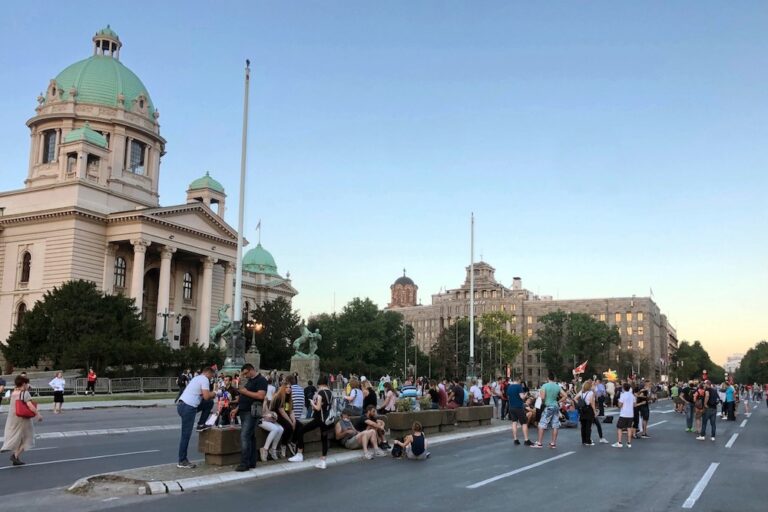(IFJ/IFEX) – The following is an IFJ press release: Media Release April 6th 1999 IFJ Calls for Safety First As Journalists and Media Are Caught in Kosovo Crossfire The International Federation of Journalists today called on media organisations and journalists to minimise risks to news teams as the military action in Kosovo and Serbia intensifies. […]
(IFJ/IFEX) – The following is an IFJ press release:
Media Release
April 6th 1999
IFJ Calls for Safety First As Journalists and Media Are Caught in Kosovo
Crossfire
The International Federation of Journalists today called on media
organisations and journalists to minimise risks to news teams as the
military action in Kosovo and Serbia intensifies.
The IFJ has called for all media organisations covering the conflict to
adhere to its International Code of Practice for the Safe Conduct of
Journalism which says that although there is often nothing media can do to
avoid casualties, they can take practical steps to minimise the risks to
staff.
The IFJ code sets out basic guidelines which tell media:
1. MAKE adequate preparation, and provide staff with equipment
2. PROVIDE insurance and social protection to anyone who is hurt
3. ENSURE journalists are properly briefed
4. AVOID taking risks for commercial advantage
“These may seem obvious, but our experience is that the basics sometimes get
forgotten in the rush to cover war and conflict,” says Aidan White, IFJ
General Secretary.
The IFJ, which produces a safety handbook for journalists called Danger!
Journalists At Work, also warns that freelance journalists and local
stringers are most at risk in the current conflict.
“Often these colleagues are employed without any proper thought for their
welfare, only promises if they deliver a good story or picture. Problems
arise when things go wrong and no-one wants to take responsibility.
“In the current atmosphere of censorship and confusion, media will
understandably take information from all available sources, but they must do
nothing that compromises the safety of journalists,” says the IFJ.
The IFJ also warns that competition between media for exclusive coverage can
lead to reckless actions. “Reporting this war is not about ratings and
circulation-building, the priority is to minimise risks and to maintain
safety. No single story is worth the life of a journalist or media staff
member.”
The IFJ Code calls on journalists and media organisations to agree to the
following minimum demands which provide a framework for safety for
journalists:
a) that all journalists and media staff in Kosovo and the surrounding
region are properly equipped, including the provision of first-aid
materials, communication tools, adequate transport facilities and, where
necessary, protective clothing;
b) that media provide risk-awareness training for staff involved in or
likely to be involved in assignments where dangerous conditions prevail or
may be reasonably expected;
c) that media provide social protection for all staff engaged in
journalistic activity outside the normal place of work including life
insurance;
d) that media provide free of charge medical treatment and health care,
including recuperation and convalescence, for journalists and media staff
who are the victims of injury or illness as a result of their work outside
the normal place of work;
e) that media recognise the need to protect freelance or part-time
employees, often employed locally. These staff members must receive, on an
equal basis, the same social protection and access to training and equipment
as that made available to full-employed staff.
“This code is not a theoretical text, it is about the flesh and blood
reality of the current crisis in Kosovo and Yugoslavia,” said White.
He said the IFJ is asking all its member unions to press media employers to
ensure that the minimum standards set out in the Code are respected.
The IFJ is the world?s largest organisation of journalists representing more
than 450,000 journalists in 100 countries, including journalists’
associations in Serbia and Kosovo.


